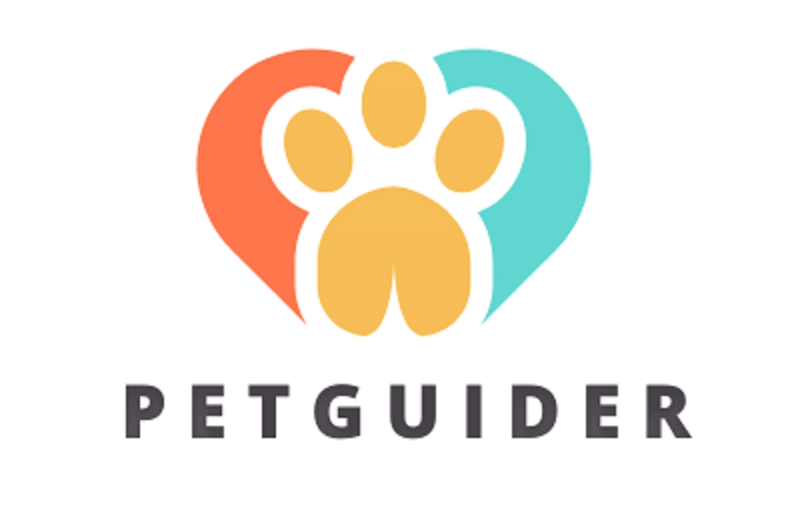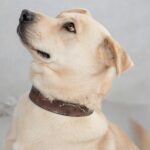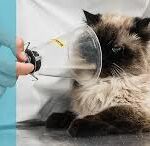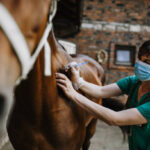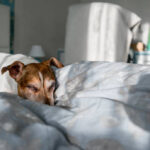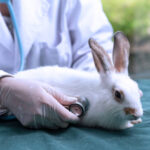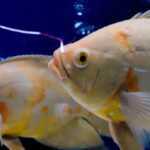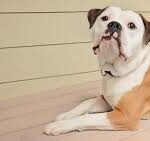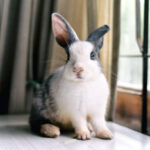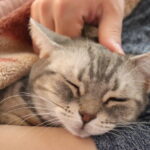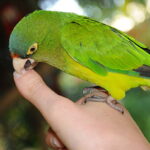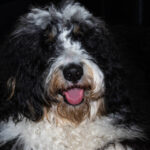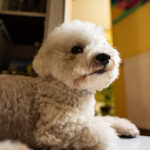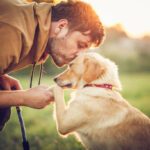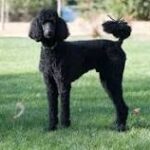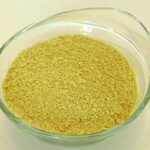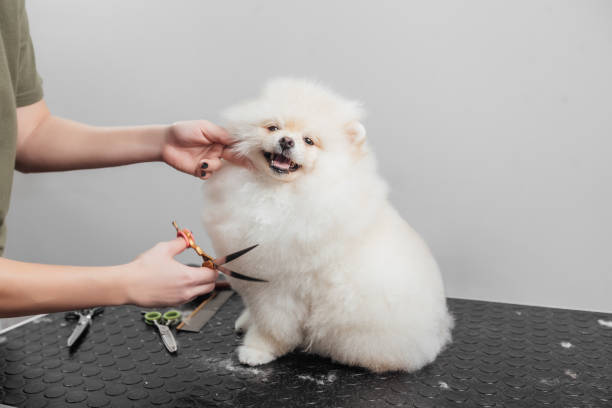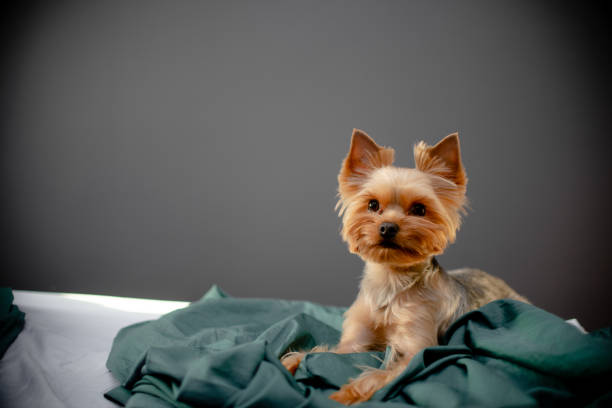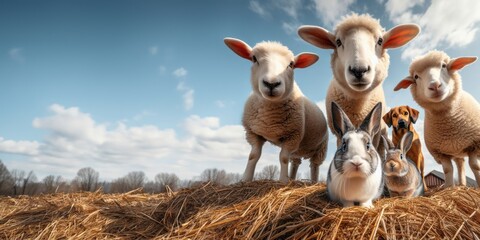A Bichapoo, also called bichapoo, is a cross between the Bichon Frise and the Poodle. At a glance, one would think it’s just a Poodle. After all, both dogs look almost the same. However, there are a few things that set them apart, and they may be noticeable in their offspring.
Thinking of getting one as a pet?
As a small dog with high energy, you should feed your Bichpoo frequent small meals of top quality food throughout the day, and because of the propensity for small dogs to have dental problems, dry food, and treats should become a mainstay of his diet. By providing high-quality food that contains all-natural, quality ingredients, you will help prevent him from picking up allergies – a health concern known to plague Bichons and Poodles. A reputable pet store will typically carry a good selection of higher-quality products. By higher quality, we mean formulas that are made with healthy ingredients, with real meat as the first ingredient on the list. Ideally, it would be a single protein source, followed by healthy fats, complex carbohydrates, and a variety of vitamins, minerals, and trace nutrients your dog needs to thrive. In addition, the formula you pick should be tailored to the unique needs of your Bichpoo, which means dry food for small breed dogs of low to moderate activity levels in the age group appropriate for your pet (puppy, adult, or senior).
If you have any concerns about your Bichpoo’s diet, it’s always a wise idea to consult with your vet. While pet food manufacturers and pet blogs provide useful feeding guidelines, these are still guidelines and not gospel. Only a vet who is familiar with your specific dog can accurately assess the dietary needs of your pup. So, always check in with your vet before making any major changes to your dog’s diet.
With Poodle DNA running through his veins, you can bet your Bichpoo is going to be one intelligent little dog who will learn quickly and prove fairly easy to train.
Training of Bichpoo:

With Poodle DNA running through his veins, you can bet your Bichpoo is going to be one intelligent little dog who will learn quickly and prove fairly easy to train. As with any puppy, his behavioral and socialization training must be done at an early age, and because Poodles can sometimes take on high-strung and clingy characteristics, you’ll want to work on this from the beginning. Understandably, many small dogs are known to revert to nipping if they feel threatened or anxious, so working with a professional trainer to discourage this tendency and develop a game plan to eliminate separation anxiety issues would be money well spent. As with any pet training, it’s important to focus on positive reinforcement and treat-based encouragement. Anything less is closer to abuse than training. It will not get you the results that you seek from your pup.
Weight of Bichpoo:

The weight of a Bichpoo is typically influenced by whether the poodle side of his parentage is a Toy or Miniature. If Toy, the Bichpoo will reach a weight of between 6-12 pounds. If he is a Miniature, you can expect his weight to range up to 18 pounds. Generally, the Bichpoo fits easily into the true small-size dog breed. As such, they don’t need too much space to be content and can do perfectly well as apartment pets as long as you provide them with plenty of space outside to exercise and spend their energy. These are lively and energetic dogs, so it won’t do them good if you leave them cooped up for long. Luckily, Bichpoos are not easy to become obese. This can happen if you neglect your pet and its diet, particularly if it’s a smaller type. However, a properly cared for Bichpoo that spends enough energy and has a lot of activities during the day will be as lean and well-built as any other healthy dog breed.
Temperament/Behavior of Bichpoo:

Sweet and loving, Bichpoo dogs make fantastic family pets precisely because of their great personality. When socialized properly, these designer dogs are bubbly and outgoing, happy to be around people, and quite affectionate with everyone they meet – but above all, with their humans. They will quickly grow on anyone who meets them! If you want a cuddly, kind dog that will love nothing more than to be petted and curl up with you when you watch the TV or lie down on the sofa after a long day, Bichpoo is your puppy.
Thanks to their parentage, these smart cookies are natural-born charmers and goofy clowns that bring joy to your everyday life with their antics. They are quite playful and intelligent, so they’ll enjoy (and require) a lot of playtime, particularly with puzzle toys. And don’t forget fetch or tug of wars – everything Bichpoos can do with their owner is something they love doing!
A common behavioral issue some Bichpoos might develop is excessive barking. This is common with Bichons and might be passed down the line to the Bichpoo. These dogs tend to bark a lot, mostly in order to get their master’s attention, warn of possible intruders, or warn anyone wishing to take away their food or toys. Some say that even though the Bichpoo is a designer breed, it can still make a good watchdog due to its tendency to warn the owner about strangers. Still, if the Bichpoo is not socialized enough at a young age, the barking might become unbearable later on. Thankfully, it can be remedied with some patient training. Of course, it helps to socialize and train your pet at an early age properly and to avoid this issue altogether.
Common Health Problems of Bichpoo:

The plus to a first-generation hybrid is that many of the serious health issues that plague the parent breeds can often bypass their offspring. Unfortunately, that can never be assumed, and new pet parents should be aware of potentially inherited issues for the Bichpoo, which can include progressive retinal atrophy, patella luxation, and allergies. While not an inherited but a health and wellness issue that is typical of all small dogs, the Bichpoo can be prone to breaks and fractures if dropped from any height. Supervision is recommended whenever young kids are involved in playtime. This is why it’s important to maintain regularly scheduled checkups with your vet, especially as they age. Any potential health issues must be identified and treated as early as possible.
A somewhat uncommon but still possible health issue amongst Bichpoos is the pesky hip dysplasia. It affects a lot of dog breeds of this size and is an inherited issue. It is a multifactorial orthopedic condition that affects the dog’s hip joint. If left untreated, hip dysplasia can lead to major changes in the hip joint, causing osteoarthritis and major pain and discomfort. Although this is a rare occurrence, it is still worth mentioning. Luckily, it can be helped with the assistance of your vet.
Life Expectancy of Bichpoo:
The average life span of a Bichpoo is 12-15 years. With 15 years being at the high end of the life expectancy amongst dogs, this means that Bichpoo is a hardy and long-lived breed. Of course, this is only achievable with good genetics, plenty of care, and a loving environment. A neglected dog is unlikely ever to reach this age. Best of all, such a generous lifespan makes Bichpoos ideal as companion dogs. If you dreamed of having a furry, four legged companion to be by your side for a good part of your life, then consider a Bichpoo as a great choice.
Exercise Requirements of Bichpoo:

The Bichpoo has loads of energy and loves to play for what may seem like endless periods to his owners. Because he tends towards energy bursts, he needs daily walks of at least one-half hour and regular playtime that will keep him physically active and mentally stimulated. This is particularly important to keep in mind for apartment dwellers who are unable to let him out for a quick run in the yard. Failure to keep your Bichpoo active and engaged may result in a dog that becomes quickly bored and restless and begins to whine, bark, and chew. Nobody wants a dog like that in their home, so regular exercise is of vital importance to avoid any of these problem behaviors rearing their ugly heads.
The Bichpoo typically exhibits many of the same characteristics as his Bichon Frise and Toy poodle parents, including a lively, intelligent, and affectionate disposition.
Because he is a hybrid breed, the Bichpoo is not a member of the American Kennel Club; however, many smaller organizations recognize this mix as a breed. The American Canine Hybrid Club, Designer Dogs Kennel Club, Designer Breed Registry, and International Designer Canine Registry all recognize the Bichon Frise and Poodle mix under the name Poochon. The Dog Registry of America, Inc. recognizes it is under all common names.
Coat of Bichpoo:
The Bichpoo’s coat is typically soft and curly, and Poodle lineage means they are light shedders and hypoallergenic. Typically, his coat is light (either white or apricot colored), and it will require daily brushing to keep it looking its best (and to prevent any unfortunate matting). A visit to the groomer for clipping should take place every six to eight weeks to prevent matting and keep his coat short and easy to care for.
Puppies:
The litter size of Bichpoo puppies can depend on the type of Poodle used in the mix. However, since Bichon Frise dog is commonly the mom of the litter, you can usually expect to see between 2 and 5 puppies. These adorable little mixes will steal your heart with their goofy behavior and cute looks, but it’s important to make sure to be careful around them. As the offspring of two small breed dogs, Bichpoo puppies are very fragile and prone to injuries, especially in their puppyhood. Don’t leave them to play with children without supervision, and monitor they don’t jump on and off high surfaces. You must take special care of Bichpoos as puppies because they are so delicate and fragile. However, this sort of love and care should only deepen the bond between this pup and his human so that it will pay off quite a bit in the long run.
Naturally, it goes without saying that puppyhood is the perfect period to start training and socialization – the earlier you start, the better. Usually, simple training can start around two months of age and slowly progress to more complex tasks, for instance, potty training, which is usually done between 12 and 16 weeks of age. As for socialization, it’s important to give your puppy a chance to grow accustomed to different pets, strangers, children, and so on – so they won’t have issues with people or animals outside the family as they reach adulthood. Just remember that they are fragile while you socialize them, and avoid rowdy small kids that could inadvertently hurt them or larger, more energetic dogs (for the same reason).
